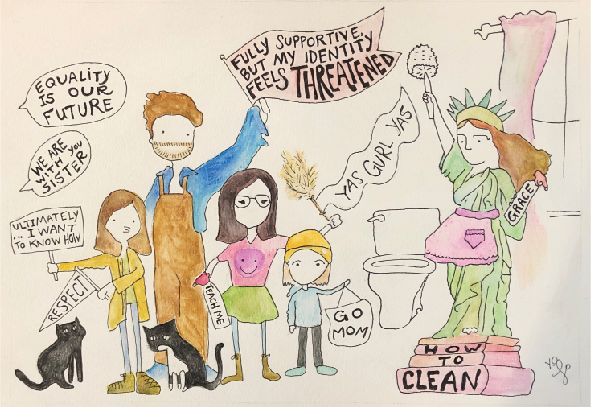I consider myself to be someone who promotes mutual respect, gender equality and adequate maintenance of the home. This might seem relatively straightforward. However, ask any woman, anywhere, if these ideals are realistically attainable, and the answer is a resounding and emphatic “no.”
The way that women have been socialized to feel solely responsible for domesticity is a source of trauma and conflict within families as well as the larger society.
Our conception of home tends to follow us no matter where we live. Through our habits, behavior and beliefs about ourselves, it’s like our past homes chase us into the present. Eventually, it all catches up to us.
The importance of a healthy home for our mental health, feelings of safety and overall well-being should not be taken lightly. In our homes, we forge our futures, as well as the futures of the individuals who dwell there and that of our families as a whole. We can choose to live in ways that mitigate conflict rather than perpetuate it.
The amount of arguing and social deconstruction between couples—the energy it takes to elevate our homes to egalitarian principles—is, at times, flat-out unbearable.
Many (perhaps nearly all) women are absolutely tired of attempting to convince men that our socially programmed domestic roles are bogus. How long do we have to wait until cavalier attitudes toward domestic equality become socially unacceptable? Thankfully, we have demonized catcalling and degrading pats on the posterior. Can we now stand together in saying it is not okay to call a woman a relentless nag when she simply wants the systemic burden of housework to be lifted?
Viewing our interpersonal relationships in a larger, gendered cultural context, it is easy to see how the fight for domestic equality might not seem worth the effort. Often it is easier in the short term to accept inequality than to remedy the underlying problem. Movement toward mutual domestic respect and fairness quickly ushers in conflict. Additionally, when we attempt to get to the bottom of problematic issues in the home, we find that we relive our past experiences of home along with the gendered expectations we learned to internalize as children. When women stand up for a rational investigation of truth and the principles of conduct and equality, the response should be one of solidarity and comradery between the sexes. All too often, this is not the case.
We know that our homes are where we establish safe spaces, positive mental health practices and upstanding behaviors for ourselves and future generations, so we must take this issue of domestic gender inequality more seriously. It is inconsistent to advocate for gender equality outside of the home but not within it.
Why can’t we work together across all genders to make healthy homes in pursuit of the goal of gender equality at large? If we want gender equality out in the world, we need to be practicing it within our homes.
Question why we, as a society, encourage women to leave abusers more often than we reprimand men for misconduct. Let’s consider that resistance to domestic equality is part of a cycle of systemic oppression. We should focus on helping women advocate for themselves, in an uncompromising attempt to push out the toxic masculinity. We should encourage men to abandon their privilege to join the fight against the oppression of women, specifically through the fair treatment of the women in their lives.
Every time I stand for gender equality in the home I try to remember these key rules:
We are human, and our anger has the potential to create its own trauma; speak kindly and walk away from conflicts that are going nowhere.
We are not alone in feeling tired and unequally yoked by society. Know that the problem is far larger than you and your family.
Most importantly, every time we stand up for the well-being of our homes, we stand up for all women. Don’t be afraid of change or troubling the water.
I also have good news: The people who resist you in your desires for equality do not have to be subject to your ideals. They can leave and you will be fine. Remember rule No. 2, you are not alone. In order to have harmonious homes, we must respect each other’s voices, efforts and labor. Let’s make home a place of restoration, refuge and comfort.
If we believe that our purpose in life is to make big waves out there in the world, we might miss the radical energy of acting locally. This urge to build the “biggest thing” is not who we are; we are part of a community that relies on us for individual actions. Within this, the largest goal and smallest task are equal, as our purpose in life is to share, love and be loved. Here, the home and the world are reciprocal proxies; they are identical spheres of purpose.
For most men, this new way of being does come with drawbacks. He will have to do things he may not like, like cleaning the bathroom. He’ll have to do these jobs for himself, others and the little ones who will need to learn these things for their future. If this feels overwhelming, he doesn’t need to worry; there are people he’s close to, perhaps who he even lives with, who have extensive experience in these matters and would be happy to share their knowledge.
Women, take heart; change is coming. Forgiveness and love are the foundation of any home, and this is the way of the future. Don’t be afraid to call upon and stand alongside one another. Let’s address mental health and gender-based conditioning with empathy. We don’t have to accept that history repeats itself. We can change together.










